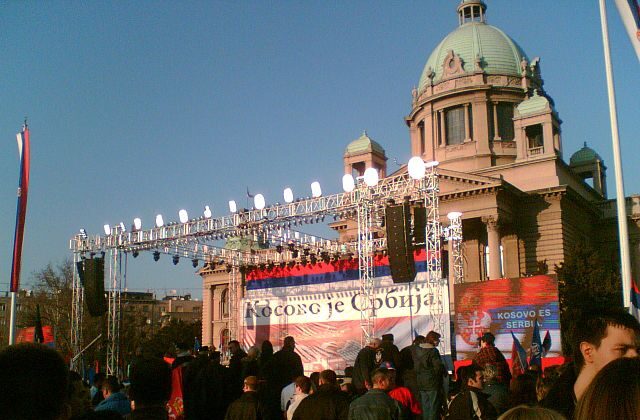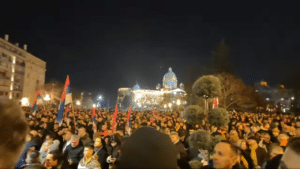Photo: ‘Kosovo is Serbia’-protest in Belgrade – Creative Commons
Kosovo is warning for a possible new war on the European continent as tensions are rising between Belgrade and Pristina. A build-up of Serbian troops along the border reminds Kosovo of the build-up to the Russian invasion of Ukraine. The United States categorically demand Serbia to lower its troop build-up on the Kosovo border. Meanwhile, snap elections in Serbia are in the air in response to growing pressure from opposition parties. Could these elections introduce a new chapter in the Serbia-Kosovo dispute?
Tension at the border
After the monastery siege in Banjska by Serbian attackers, northern Kosovo, on the 24th of September, which led to one police officer and three attackers being killed, tensions have been rising again in the border region of Serbia and Kosovo. Thirty heavily armed Serbs – linked to government forces by Kosovar authorities – attacked a police patrol near the village and in the immediate aftermath of the siege, Serbia has increased the number of troops near the border. Pristina says this is “the next step by Serbia to threaten the territorial integrity” of Kosovo. Kosovo’s Prime Minister Kurti has also claimed the attack in Banjska is part of a larger plan to annex northern Kosovo. The United States have demanded Serbia to pull back their troops. While Kosovo says Serbia’s behaviour is the same as Russia’s before its Ukraine invasion, Vucic claims Serbia does not want war as it would harm their aspirations to join the EU. It seems Serbia adheres to the call and indeed does not want war, as it has lowered its number of troops already. It takes the tension out of the air for now, but the question is for how long. Especially now the relationship between Belgrade and nationalist groups in northern Kosovo is slowly deteriorating – the Banjska attack was committed by the Belgrade-backed Serb List party but they claimed that they acted on their own accord – which could lead to more provocations by Kosovo Serbs.
Early elections
Hundreds of Serbians gather weekly for anti-government protests and demonstrations against violence, following two mass shootings last May, leaving seventeen people dead. Since then, Vucic has insinuated that early elections are likely to take place this year or in early 2024. The recent attack on the village of Banjska seemed to be the last straw. Vucic announced Serbia is ready to hold snap general elections on the 17th of December, after the opposition had again demanded early elections. “You have to respect democracy, respect the opposition parties”, Vucic added in its statement.
Vucic’ grip on politics
The question is if elections will change anything in the political landscape. Vucic has increasingly become an autocratic leader with a firm grip on all sources of power, including the mainstream media. He has fuelled hate speech towards the Serbian opposition tremendously during his eleven-year rule. Vucic will be keen on making the Kosovar issue an important topic during the campaign and has proved to take a nationalistic viewpoint on the matter. He has positioned himself as a strong leader and will use foreign pressure on Serbia to uphold international agreements as a precursor of ‘foreign meddling’ into Serbia. Nationalist rhetoric will thrive in the Vucic-dominated media. The Kosovo issue will also take attention away from domestic problems Vucic is held responsible for. Now he can call out elections on the appearance of protecting Serbs from a possible war instead of on the issues opposition parties have been putting forth.
Campaign promises
The Vucic government has been hinting on early elections for a longer time now and is already trying to persuade targeted voters by promising financial support to these selected populations. Serbia revised its budget last September reducing commitment to the environment while expanding its defence budget due to the Ukrainian war but also regional tensions. Meanwhile, the most significant beneficiaries of the budget revision are those that are seen as potentially supporting Vucic’ SNS party, like farmers, pensioners, and young families. The budget revision is part of Vucic’ electoral campaign and has been a common practice in hybrid electoral autocracies, as seen in Serbia, but also Hungary or Türkiye.
The situation at the Serbia-Kosovo border remains tense. Nation-wide elections in Serbia could change something in Serbia’s politics but its firm stance against Kosovo appears to remain in all cases. Escalation in the upcoming months could only help improve Vucic’ chances in the elections. At the same time, flare-ups like the most recent one in Banjska complicate a resolution and postpone the promised EU-future. It remains absolutely pivotal that the EU holds the firmest stance towards Serbia, as Vucic destabilises a whole region with its bid to stay in power and to uphold autocracy. This should go in tandem with support for democratic actors in the country, and observation of free and fair elections – if these will take place in the upcoming months.
Written by Timon Driessen



